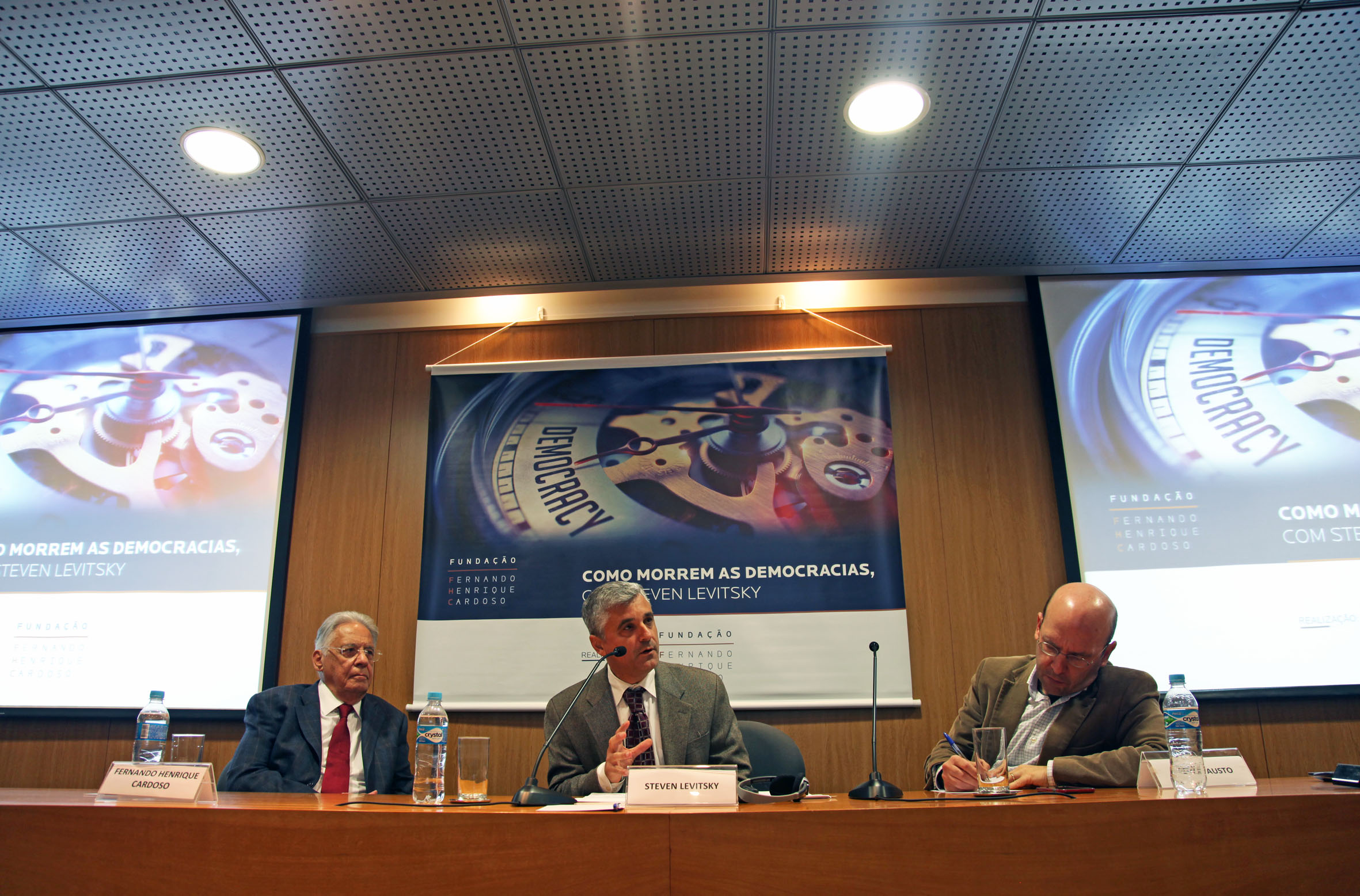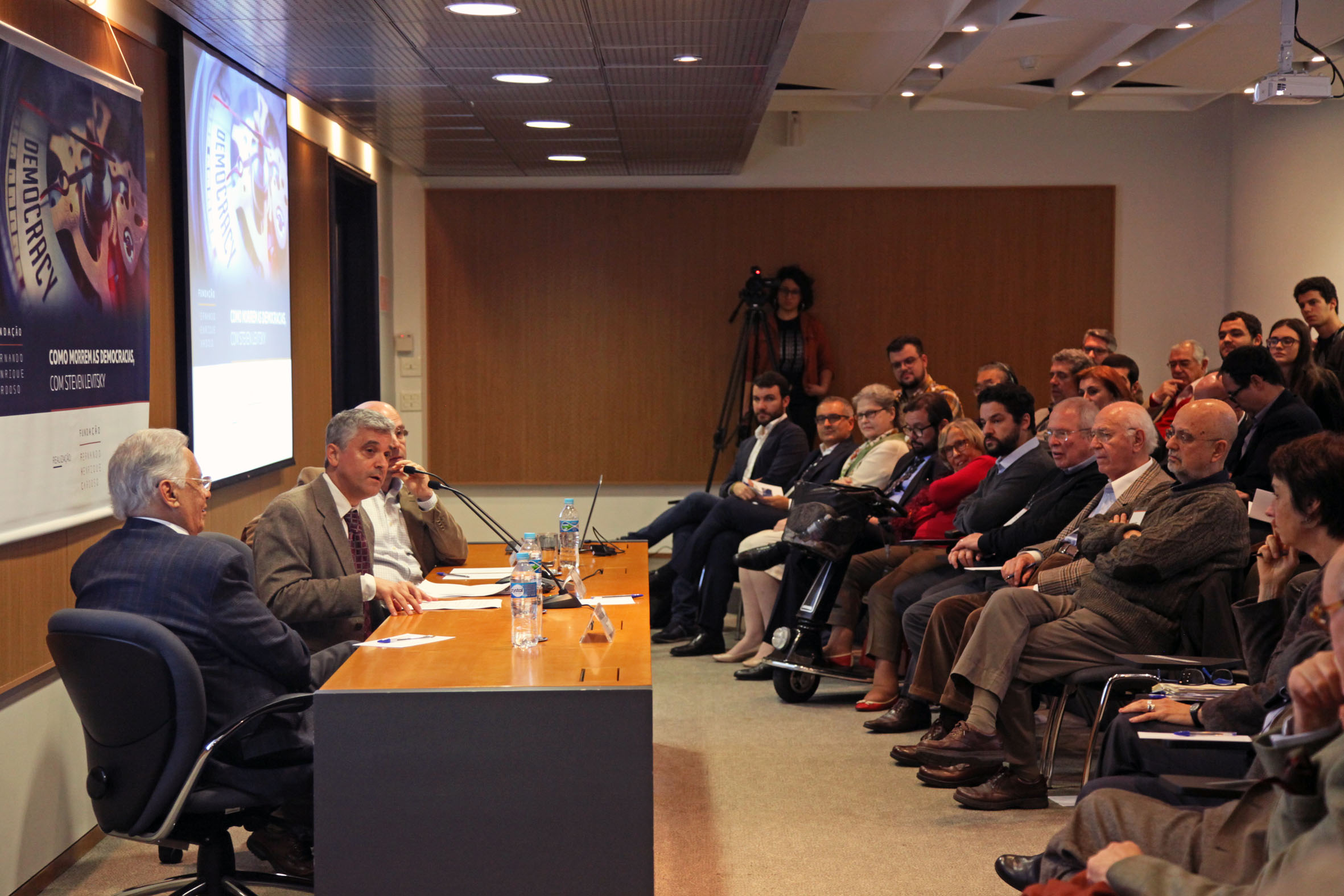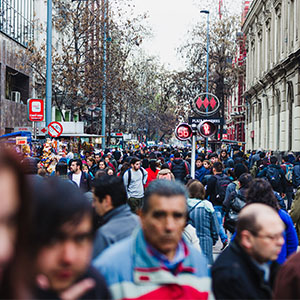"Despite facing a 'perfect storm,' due to the conjunction of a deep economic crisis with one of the most extensive investigations of corruption in history, in the last 25 to 30 years Brazil has done a tremendous job in consolidating its democracy. You should not not give in to the temptation to put a candidate with authoritarian tendencies in the Presidency."
Steven Levitsky, a North American political scientist, is the author of How Democracies Die: What History Reveals About Our Future, co-authored with Daniel Ziblatt
Speaking at the Fernando Henrique Cardoso Foundation, Steven Levitsky, a Harvard University professor, has studied the relationship between populism and authoritarianism for years, as well as party building in contemporary Latin America. He warned of the risk of Brazil electing a potential autocrat in October 2018. "If a candidate, in his life, political career or during the campaign, defended undemocratic ideas, we must take him seriously and resist the temptation to support him, even if, given momentary circumstances, it seems to be an acceptable option”, he said.
The political scientist (Ph.D. from the University of California, in Berkeley) is the author, along with Daniel Ziblatt, of one of the most popular books at the current moment, How Democracies Die: What History Reveals about Our Future (Penguin Random House, 2018), which will soon be published in Brazil by Editora Zahar.
Levitsky also said that sectors of the country's political and business elite must resist the temptation to open the doors of power to a politician with an authoritarian bias in the illusion of being able to control him later. "Building strong institutions takes decades, and a slip can have serious consequences in the medium and long-term”, he warned.

'It is not recommended to force limits'
In brief but compelling comments on Brazilian politics (which he acknowledged he did not know deeply), Levitsky lamented the growing political polarization in the country: "Politicians and Brazilians who have a strong democratic conviction need to relearn to speak for democracy, this being the highest order value. When people lose hope in democracy, the path will be open to the emergence of authoritarian, populist, and demagogic leaders”.
Cautiously, the political scientist commented on the impeachment of President Dilma Rousseff (2016) and the conviction and arrest of former President Luiz Inácio Lula da Silva, who was prevented from running for the presidency in 2018. “The impeachment of Dilma and the lawsuit against Lula have followed the legal and constitutional rites, in that sense, I believe it was not a coup, however they have provoked a strong political upheaval, whose consequences are difficult to predict", he said.
“It’s not recommended to force the limits of a democracy”.
"On the one hand, center-right and right-wing supporters, dissatisfied with corruption cases and the economic crisis and suspecting that the PT was acting to perpetuate itself in power, supported Dilma's impeachment and Lula's arrest. On the other, PT supporters and the left accuse their opponents of using 'technicalities' to gain power without a majority of votes and using illegitimate means to prevent Lula's return to office. The consequence is that both have come to see the other side as an existential threat, which is very negative for democratic coexistence”, he said.
Polarization in the USA
Political polarization is not only a Brazilian problem; it also worries the United States, one of the most solid democracies in the world and where the alternation of power between Republicans and Democrats, the two main parties, has always been a widely accepted principle. "The moment one side begins to see the other as an enemy and starts to question their credentials to exercise power even after they have won the elections is when we should worry”, he stated.
According to the professor, this happened during the Obama Administration (2009-2017), when radical sectors of the Republican Party spread the rumor that the first African-American president was not born in the country and therefore could not occupy the White House.
During the 2016 campaign, Republican candidate Donald Trump himself, who eventually won office, questioned Obama's natural citizenship. Levitsky expressed heavy criticism of the Republican Party for its failure to prevent the businessman that metamorphosed into a politician to capture the political group, paving the way for him to take over the White House.
"The party's top leaders were aware that Trump was a dangerous demagogue, but acted as if it were a normal election between two candidates with strong democratic credentials. The result is that today the White House is occupied by a potentially authoritarian president, which is very serious”, he said.

The autocrat's test
Levitsky proposed a test with only four questions to identify whether a candidate for public office has authoritarian tendencies:
1. Does the candidate reject, in words or deeds, the fundamental rules of democracy?
2. Does the candidate question the legitimacy of his or her opponents?
3. Does he or she tolerate or encourage political violence?
4. Does he or she accept or propose restricting civil liberties?
"Most autocrats do not pass this simple test”, he said.
Self-Control
According to the speaker, there were many times in his political upheaval that the current president of the most powerful country in the world made statements that would have him fail the proposed autocrat test. In February 2017, the Republican wrote on his Twitter account: "The press of fake news ... is not my enemy, it's the enemy of the American people", citing the New York Times and broadcasters like CNN and CBS. On August 15, more than 300 American newspapers published editorials advocating freedom of the press.
According to Levitsky, the strength and support that the US Constitution has among the population guarantees, to some extent, that a president with authoritarian tendencies does not cross the line and compromise democracy. However, he says, "there are certain unwritten rules which are part of the democratic game and can be more easily manipulated.”
"Unscrupulous politicians can explore between the lines of the constitution to undermine their spirit. For example, in the Supreme Court, by only appointing judges that are considered loyal to their parties’ ideas, putting the balance of the Judiciary at risk in the medium and long-term", he said. "For the good of democracy, a head of State or government must exercise a certain amount of self-restraint, avoiding using the broad power it enjoys to play hard against its opponents”, he continued.
“When people realize, it’s already too late.”
In his popular book, published in January of this year and co-authored by Daniel Ziblatt -- who is also a Harvard professor and specialist in State construction, democratic ruptures, political parties and political and economic history, with emphasis in Europe from the 19 Century until present times -- they defendthe thesis that democracies no longer die as a result of armed actions or military coups.
They are undermined much more subtly, when legitimately elected presidents or prime ministers use constitutional means, such as plebiscites and referendums, or legal maneuvers, including changes in the Constitution, to gradually expand their power and, step by step, subvert the regime.
"Today, the subversion of democracy occurs slowly and incrementally. One of the first steps is to control the Judiciary. Then comes the persecution of the independent media and political opponents, intellectuals and social leaders, as well as the progressive control of the state and even sectors of the economy. When people realize what's happening, it's already too late”, Levitsky explained.
Levitsky cited recent examples of legitimately elected rulers who had this trajectory, such as the Venezuelan President Hugo Chávez (that ruled for 14 years, from 1999 until his death in 2013, and was succeeded by Nicolás Maduro), the Turkish Recep Tayyip Erdoğan (elected prime minister in 2003, he changed the Constitution to install a presidential regime and then he was elected president in 2014) and the Russian Vladimir Putin (who has ruled Russia since 1999, initially as prime minister, then as president, again as prime minister and has recently been re-elected for a fourth presidential term).
"We must do everything we can to prevent an anti-democratic candidate from gaining power, for once he gets there, there will be no doubt that he will put his authoritarian ideas into practice. To prevent this from happening, it is even worth joining political opponents with different opinions, as long as they are firmly committed to democracy”, said the speaker.
"The danger is when traditional politicians or representatives of the economic elite open the doors of power to radicals with authoritarian bias, imagining that, after the election, it will be possible to keep them under control. History shows that this can have serious consequences, as in the case of Adolf Hitler's rise in Germany in 1933”, he warned.
Link to the original text here.
Otávio Dias, journalist, is the content editor of the Fernando Henrique Cardoso Foundation. He was the Folha’s correspondent in London, editor of estadão.com.br and chief editor of the Brasil Post, a partnership between the Huffington Post and Grupo Abril.
Translated by Thomas Garman.









